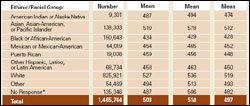Several days after the College Board reported that scores on the reworked SAT showed the most significant drop in over three decades, experts were still speculating about the reasons for the decline and what its impact on college admissions might be.
Average SAT scores for this year’s high school graduates, the first to face the revamped test unveiled in March 2005, dropped a combined 7 points below last year’s composite scores on the mathematics and critical-reading sections, the New York City-based sponsor of the test reported on Aug. 29.
Further information on the 2006 results, including links to the report, charts, and data is available from the College Baord.
Some observers said the drop in scores could be partly explained by the revisions to the 80 year-old test, including the much-discussed addition of a 45-minute writing section, which made the SAT longer, and possibly more challenging. (“SAT’s Next Chapter About to Be Written,” Feb. 2, 2005.)
Christine S. Parker, the executive director of high school program development for the Princeton Review, a New York City-based test-preparation company, said she was skeptical that the new test was the same difficulty level as the previous version, since there are now some math questions based on Algebra 2.
“I don’t see how you can expect a more advanced year of math but not make the test harder,” she said. “That seems a little strange to me.”
College Board spokeswoman Caren L. Scoropanos, disputed that contention, saying the board’s test was designed so that students would receive scores comparable to those they would have gotten on the previous version.
About 1.45 million students, or 48 percent of this year’s high school graduates, took the test during high school—a decrease of about 10,000 students from the previous class’s total. The average mathematics score dropped by 2 points, to 518, out of a possible 800, while the average score on the critical-reading portion fell 5 points, to 503 out of 800. The first average score on the writing section, which includes multiple-choice questions in addition to an essay, was 497 out of 800.
Except for Asian-Americans, a large gap exists between minority and white students in the class of 2006 who took the revamped SAT.
*Click image to see the full chart.

* No Response indicates that students did not complete the SAT questionnaire, did not answer the question about their race/ethnicity, or stated that they did not wish to answer that question.
SOURCE: College Board
If colleges perceive a difference in difficulty or believe the test was not properly crafted to yield equivalent scores, they could consider accepting students with lower SAT scores than they would normally admit, said Joseph J. Pedulla associate professor of education research and the director of the Center for the Study of Testing, located at Boston College.
Others speculated that admissions officers might decide to put less emphasis on the SAT.
“There’s been much less of the trust of the College Board and the reliability of the SAT” recently, said John Maguire, a former Boston College dean of admissions and College Board trustee who now serves as a private consultant on admissions for more than 100 colleges.
He said that a recent SAT scoring mishap, in which some 27,000 tests taken in October 2005 were graded incorrectly, had already spurred skepticism about the College Board’s test.
Fewer Retakers
The College Board itself attributed the drop in scores largely to changes in test-taking patterns, including the fact that fewer students in the class of 2006 chose to retake the test. It noted that students who take the SAT a second time typically see a bounce of about 30 points combined on two older sections of the test.
“When you introduce a new test, students change their behavior,” and this affects scores, Gaston Caperton, the president of the College Board, said on an Aug. 29 conference call with reporters.
That explanation could prompt high school guidance counselors to urge students to take the test more than once, said Carolyn B. Stone, the president-elect of the American School Counselors Association, based in Arlington, Va.
Some observers praised the writing section as giving girls, who have traditionally not done as well as boys on the sat, a greater chance to shine. Girls scored an average of 502 on the writing section, outperforming boys by 11 points. That gender pattern was apparent across every racial and ethnic group.
In addition to the new writing section, the revamped version includes more advanced math, and a revamped reading section that uses longer passages to test comprehension.
The average score for the critical-reading section for boys dropped by 8 points, to 505, while the average for girls fell 3 points, to 502. Average scores for both genders declined two points on the mathematics portion, with boys scoring 536 and girls scoring 502.





